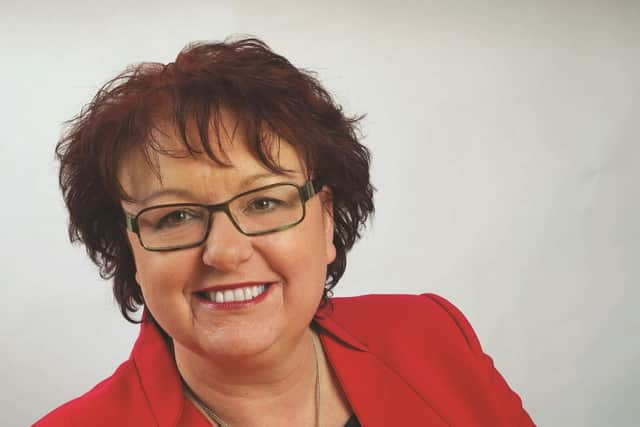Derision of experts in politics could have harmed coronavirus response, former council boss warns
and live on Freeview channel 276
Jo Miller, who until last year headed up Doncaster Council, is now chief executive at Hutt City Council in New Zealand.
Speaking to the Yorkshire Post’s Pod’s Own Country podcast this week, she outlined the difference in the approaches between the UK Government and that in New Zealand to tackling the pandemic.
Advertisement
Hide AdAdvertisement
Hide AdAnd she said the Government must listen to the North as the UK starts to move towards recovery.


New Zealand has been praised for recording just 22 coronavirus deaths, and for the clear communication from Prime Minister Jacinda Ardern.
But compared to the UK’s population of 66.5m, New Zealand has just 4.8m people. Yorkshire has a higher population than the whole country, standing at 5.3m.
But Ms Miller said: “At the very start of March, the PM announced this level system, but before she announced it as a local government chief executive, we were working with central government to say, if this went from containing something to locking it down, what would a ramping up of that mean in terms of public facilities?
Advertisement
Hide AdAdvertisement
Hide Ad“And speaking to UK colleagues, I think that sort of collaboration is quite different and speaking to my health colleagues.”
Ms Miller said announcements had been made in collaboration with local government, a stark contrast to the UK where local leaders have said they were learning of new measures at the same time as the public.
Speaking in the context of local lockdowns Liverpool City Region mayor Steve Rotheram this week said: “There's some confusion over what local lockdown actually means and that's why sometimes Government's announcements would be better if they came after consultation, not the announcements and then a consultation period.”
He added: “I think what we need to do is if there are suggestions about local lockdowns, we need to speak to our local authorities first to get their views and then we can, together, after consultation ensure that if there are to be local lockdowns, we could actually do it.”
Advertisement
Hide AdAdvertisement
Hide AdMs Miller said in New Zealand “whilst it's been led from the top, it has been this collaborative effort and I think that is one of the things that defines New Zealand’s response.”
Comparing local government in the UK to that of New Zealand, Ms Miller said that the UK was better prepared to share information and data to react to a national emergency such as the coronavirus.
But she said the key was using that ability to identify people who, for example, may have a psychological need or were vulnerable and may need more support in a health crisis.
“Some of the building blocks are there locally in the UK, if only Government would respect them and use them,” she said.
Advertisement
Hide AdAdvertisement
Hide AdMs Miller said: “I'm desperate for the UK to get through this as much as anybody else. But I think there is a really hard and needed conversation to have in the UK about public life and the state of politics.”
She said she found it “loathsome” that “it appeared to be a winning strategy to keep the Great British public in a permanent state of discombobulation”.
She gave examples of the Scottish Independence vote, Brexit, and the General Election, and added: “Then you've had that whole deriding of experts.
“I think that that meant that the UK has been in a really difficult space.
Advertisement
Hide AdAdvertisement
Hide Ad“I think that's a massive challenge for the UK where it doesn't feel like there is that kind of collaboration and messaging between experts, politicians, civil servants, central government, local government.”
Ms Miller also recognised there had been issues in protecting the country’s indigenous Māori population from the coronavirus as well as they could have done.
Ms Miller said: “Māori make up 20 per cent of the population. But 70 per cent of the female prison population are Māori women, Māori young people are twice as likely to be unemployed, that's not because Māori are less clever or more criminal, it's because the colonial system is systemically racist. And we have to change that.
“Just looking locally at some of the stuff we got wrong, we've got a chronic housing supply issue and a chronic homelessness issue, and as we locked down the need that that sprung up around food parcels and welfare was almost overwhelming.
Advertisement
Hide AdAdvertisement
Hide Ad“And we managed that but managed it just in time, and that was because we didn't really know what was happening behind so many of our doors.”
She added: “Because we didn't have local joined up public services in the same way that local government [in the UK], it meant that if somebody had a multiple need, it was really hard to get to them.
“I know I'd have been better able to do that in the UK, because even if the links weren't there nationally, they were there locally. So that's, that's something for us to change as we go forward.”
Looking towards recovery, Ms Miller said: “There is a sense of community and looking out for each other like no other in that Yorkshire identity, and that resilience will get people through.”
Advertisement
Hide AdAdvertisement
Hide AdBut she added: “What has to happen with that is that the Government has to trust not just local government, but it has to trust the players in the North, whether that's the people, the politicians, the institutions, business.
“The North knows what's best for the North, and Government needs to listen and and act on it, not to pontificate and decide.”
Comment Guidelines
National World encourages reader discussion on our stories. User feedback, insights and back-and-forth exchanges add a rich layer of context to reporting. Please review our Community Guidelines before commenting.